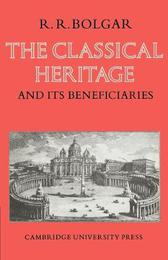
|
The Classical Heritage and its Beneficiaries
Paperback / softback
Main Details
| Title |
The Classical Heritage and its Beneficiaries
|
| Authors and Contributors |
By (author) R. R. Bolgar
|
| Physical Properties |
| Format:Paperback / softback | | Pages:604 | | Dimensions(mm): Height 215,Width 137 |
|
| Category/Genre | linguistics |
|---|
| ISBN/Barcode |
9780521098120
|
| Classifications | Dewey:940.1 |
|---|
| Audience | | Professional & Vocational | |
|---|
| Illustrations |
Worked examples or Exercises
|
|
Publishing Details |
| Publisher |
Cambridge University Press
|
| Imprint |
Cambridge University Press
|
| Publication Date |
20 December 1973 |
| Publication Country |
United Kingdom
|
Description
Since its first publication in 1954, The Classical Heritage has become established as a classic introduction to cultural and intellectual history from the Carolingian age to the end of the Renaissance.
Reviews'Mr Bolgar continually suppies concrete and fresh or unfamiliar information that makes the shadowy more substantial, and analytical comments that enrich or qualify or explode over-simple generalizations ... There are few men who have the zeal, the comprehensive learning and the historical insight even to contemplate a single-handed work of such scope, and as a history and active reinterpretation of a great movement, Mr Bolgar's book is richly informative and illuminating.' Douglas Bush, Renaissance News 'Bolgar's work is thick with new material and, better still, it draws many new diagonals through old subjects. The author's main interest centers in modifications in education, but he branches out to show the basic changes in law, philosophy, medicine, and literature in the Byzantine world ... But to anyone interested in the intellectual history of the centuries A.D. 700 to 1600 the book will be a grande trouvaille.' Frederick B. Artz 'He posses not only the vast knowledge required to fish in such wide waters, but the rarer capacity to synthesize his results; his powers of analysis are only equalled by his powers of judgment. He always keeps a firm grasp on the main thread of his argument; he never swamps the reader with mountains of unassimilated facts; he possesses not only a Gibbonian commoon sense ... but a neo-Gibbonian prose style which is a delight to read, and is a welcome rarity among contemporary scholars. Rarer still is his astringent wit, as relevant as it is illuminating.' The Times Literary Supplement
|